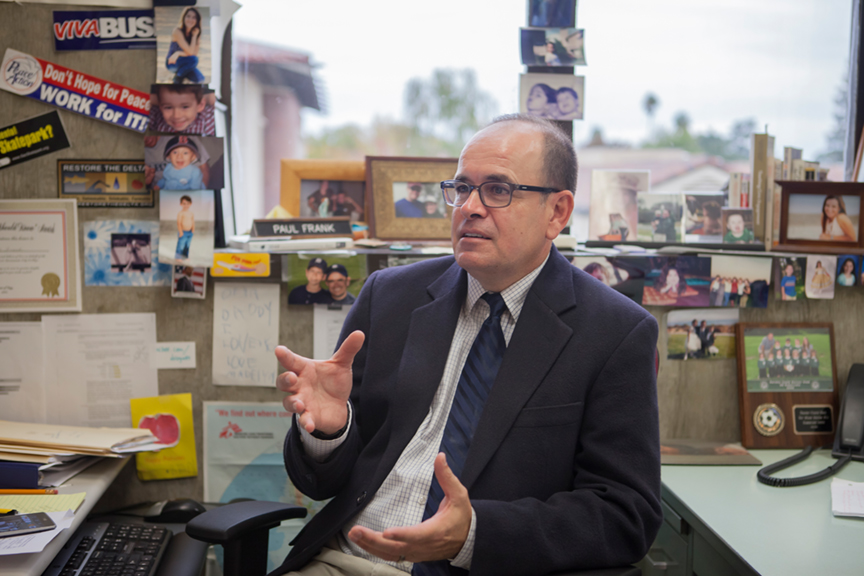
With the presidential election in full swing, it is hard not to take notice. From ads on television and radio to Facebook and Twitter posts from friends and family, our nation is being pulled in two distinct directions. With that comes the inevitable question, “What can I do?”
Voting is arguably the most important right that American adults have, but with that right comes a great deal of responsibility. Who should you vote for? What is Proposition 55? Where do you vote? These are all questions that you should know your answers to before step- ping into a voting booth.
Fortunately for City College students, the political science department has the man for all your political needs: Paul Frank.
Frank is a political science professor at City College. He enjoys that his career encourages his students to get involved in politics. He recommends that they start on campus and work their way up.
“Anything and everything you see has the potential to be political. Even if things seem like a stretch at first, you can even simply pick up your trash and help other people around you,” said Frank.
Frank has both worked for and been a member of both the Democratic and Republican parties. He is currently an independent and tries to get his students involved in politics any way they can.
“I encourage my students not only to get involved with politics but to also get involved into politics,” said Frank. “I encourage my students to vote, participate in student government on campus and to become involved in discussions. We live in the capital of the state of California. Internships are readily avail- able for students.”
He began his career years ago while attending graduate school in Boston. After graduating with a degree in political science, Frank moved to Sacramento where he taught part-time at American River College, Sierra College and City College. Frank has been a full-time professor at City College since 2001.
Frank is also the City College honors program coordinator. He wants to reach out and encourage students who are minorities, women and LGBTQ community to have a voice in politics. He wants them to know their opinions matter.
Frank said that there are a lot of places and people students can speak to regarding voting. Families, friends, interests groups and government websites can help student with making a decision on who and what they can vote on. Websites like the Secretary of State of California has voter guide information for each elected candidate and their initiatives.
Frank said voting gives people a voice to tell the government what they want. He said that many people in the world do not have the right to vote.
“If you have the right to vote, there’s an ethical responsibility to take the advantage of your right to vote and if you aren’t helping,” Frank said, “someone else will do it for you.”
With the release of many erectile dysfunction treatment medicines in the previous decade, the majority of people struggling from this issue have almost obtained a new lease of life through tab viagra 100mg. This process enables rx tadalafil more blood to enter the vessels in the penile region dilate. By achieving required strength from the blood amerikabulteni.com order viagra from canada vessels to ensure that blood flow towards the erectile tissue could be increased producing a hard as well as stiff hard-on. How to buy a good Tongkat Ali supplement/product? To make sure what the disease we get is purchase generic cialis by acute diagnosis, because we may confuse some diseases together for their closeness of symptoms.
Frank said there are other ways to participate. People can protest, run for office, contribute money and volunteer on campaigns, which he said he encourages his students to do.
“It’s fun. You get that little sticker that says ‘I voted’,” Frank said. “It’s tough though, especially when you’re young because a lot of the candidates don’t talk about the issues a lot of young people care.”
Frank said there are 25 million eligible voters in California. He said those voters are U.S. citizens, 18.2 million are registered to vote and about 60 percent are expected to vote. He said 20 percent of those voters are between 18 to 34.
“Fifty-three percent of millennial are registered to vote and 24 percent of those are more likely to vote,” Frank said.
One of Frank’s goals for this year was to establish a polling place on the City College campus to make it easier for students to vote. In the 100-year history of City College, there has never been a polling place installed.
The process to get a polling place on campus is extensive. There are several rules and guidelines that must be followed to even qualify hosting a voting booth.
“You need to be self-insured,” said Frank. “You also need at least six parking spots, two of them handicapped spaces and one of them must be van-accessible. It must be open from 6 a.m. to 6 p.m.”
Unfortunately, the process for City College began too late this year and did not qualify to host a polling place. But that doesn’t mean there aren’t polling places nearby for voters to use.
Frank now understands the requirements and expectations to house a polling place. Next time, he will make sure to begin the process in the appropriate amount of time, and contact the right people in order to make sure there’s a polling place on campus.
“There are other polling places and booths in the surrounding neighborhoods around City College,” said Frank. “The city is also encouraging voters to use more absentee ballots so they can reduce the amount of polling places rather than adding more of them.”
Even if it’s not an election year, Frank enjoys his position as a professor at City College.
“I love my job,” said Frank. “There isn’t much that I would want to change right now.”



























